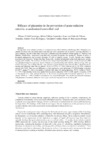Mostrar o rexistro simple do ítem
Efficacy of glutamine in the prevention of acute radiation enteritis: a randomized controlled trial
| dc.contributor.author | Vidal-Casariego, Alfonso | |
| dc.contributor.author | Calleja-Fernández, Alicia | |
| dc.contributor.author | Ortiz de Urbina-González, Juan José | |
| dc.contributor.author | Cano-Rodríguez, Isidoro | |
| dc.contributor.author | Cordido, Fernando | |
| dc.contributor.author | Ballesteros-Pomar, María D. | |
| dc.date.accessioned | 2016-03-07T12:20:28Z | |
| dc.date.available | 2016-03-07T12:20:28Z | |
| dc.date.issued | 2013-03-07 | |
| dc.identifier.citation | Vidal-Casariego A, Calleja-Fernández A, Ortiz de Urbina-González JJ, et al. Efficacy of glutamine in the prevention of acute radiation enteritis: a randomized controlled trial. J Parenter Enteral Nutr. 2014;38(2):205-213 | es_ES |
| dc.identifier.uri | http://hdl.handle.net/2183/16206 | |
| dc.description.abstract | [Abstract] Background: Acute radiation enteritis is a common adverse effect related to radiotherapy (RT). Glutamine is an immune modulator and antioxidant amino acid that can exert a protective role in patients receiving abdominal or pelvic radiation. The aim of this study was to test if glutamine prevents radiation enteritis during RT. Materials and Methods: Double-blind, randomized, controlled trial including 69 patients who needed RT because of pelvic or abdominal malignancies and received glutamine (30 g/d) or placebo (casein, 30 g/d). Enteritis was evaluated according to the Radiation Therapy Oncology Group scale, intestinal inflammation using fecal calprotectin, and gut integrity with citrulline. The incidence of enteritis was analyzed by Kaplan-Meier curves, and the hazard ratio (HR) was calculated using Cox regression. Results: Patients were predominantly male (65.2%), with an average (SD) age of 66.6 (9.9) years, with urologic (44.9%), rectal (24.6%), or gynecological cancer (23.1%). More patients developed enteritis with glutamine than with the placebo (55.9% vs 22.0%; P =.002), with an HR of 1.59 (95% confidence interval, 0.62-4.05). There were no differences in final calprotectin levels (glutamine, 57.9 [85.8] mg/kg vs placebo, 54.0 [57.7] mg/kg; P =.182) or the number of patients with values >50 mg/kg (glutamine, 58.1% vs placebo, 54.6%; P =.777). Final citrulline levels were similar between groups (glutamine, 26.31 [10.29] mmol/L vs placebo, 27.69 [12.31] mmol/L; P =.639), without differences in the number of patients with <20 mmol/L (glutamine, 24.1% vs placebo, 25.0%; P =.938). Citrulline concentration was reduced during RT with placebo but remained unchanged with glutamine. Conclusion: Glutamine does not prevent the development of enteritis during RT. © 2013 American Society for Parenteral and Enteral Nutrition. | es_ES |
| dc.description.sponsorship | Castilla y León. Consejería de Sanidad, SACYL GRS 326/B/08 | es_ES |
| dc.language.iso | eng | es_ES |
| dc.publisher | SAGE | es_ES |
| dc.relation.uri | http://dx.doi.org/10.1177/0148607113478191 | es_ES |
| dc.subject | Acute radiation enteritis | es_ES |
| dc.subject | Calprotectin | es_ES |
| dc.subject | Citrulline | es_ES |
| dc.subject | Glutamine | es_ES |
| dc.subject | Nitric oxide | es_ES |
| dc.title | Efficacy of glutamine in the prevention of acute radiation enteritis: a randomized controlled trial | es_ES |
| dc.type | info:eu-repo/semantics/article | es_ES |
| dc.rights.access | info:eu-repo/semantics/openAccess | es_ES |
Ficheiros no ítem
Este ítem aparece na(s) seguinte(s) colección(s)
-
GI-FENM - Artigos [106]






